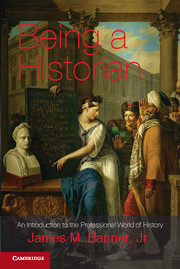Book contents
- Frontmatter
- Contents
- Preface
- Acknowledgments
- 1 The Discipline and Professions of History
- 2 The Structure of the Discipline of History
- 3 A Multitude of Opportunities
- 4 The Academic Trinity
- 5 History outside the Academy
- 6 Teaching and Writing History
- 7 Professional Principles, Responsibilities, Rights
- 8 Being Oneself as Historian
- Index
- References
6 - Teaching and Writing History
Published online by Cambridge University Press: 05 June 2012
- Frontmatter
- Contents
- Preface
- Acknowledgments
- 1 The Discipline and Professions of History
- 2 The Structure of the Discipline of History
- 3 A Multitude of Opportunities
- 4 The Academic Trinity
- 5 History outside the Academy
- 6 Teaching and Writing History
- 7 Professional Principles, Responsibilities, Rights
- 8 Being Oneself as Historian
- Index
- References
Summary
Teaching, writing, and reading are the universal undertakings of historians. Of the three, teaching and writing require a concentration of will, a summoning of imagination, and an extension of self unimaginable to those who have attempted neither. Moreover, to be pursued well, teaching and writing require preparation and, above all, practice. Yet despite the innate difficulties associated with teaching and writing and the centrality of both to the professional lives of historians, they are activities for which aspiring professional historians are still too little schooled. Teaching and writing are also activities to which historians-in-training are asked to give too little formal or concentrated thought, except perhaps when they struggle to prepare their first classes or push ahead with their dissertations (although there is evidence that this neglect is gradually being addressed in graduate programs). It may be, as some allege, that skilled teaching and writing, if not already possessed as a natural gift, cannot be taught, that one can become skilled in each solely through solitary practice. Even if so (and the validity of the claim is doubtful), these basic components of professional history work warrant more serious attention than they are typically given.
One is not a historian, academic or public, unless one teaches – in front of a class; through books, articles, museum exhibits, or films; or by the very example, visible to others, of pursuing historical knowledge. In fact, a nonteaching historian is a contradiction in terms. Nevertheless, historians rarely think of their vocation as teaching or announce themselves by using the term that defines what all of them are – teachers. They are, they prefer instead to say, “professors,” “scholars,” “curators,” or “editors”; they are “members of the history faculty,” “National Parks historians,” or “producers of history films.” One cause of this terminological quickstep is historians’ frequent desire to elevate themselves above the “mere” status of schoolteacher – a distinction that reflects ill on those who dance it, especially since a fair number of schoolteachers are also scholars and writers of note and as knowledgeable about the past as their colleagues on college and university faculties.
- Type
- Chapter
- Information
- Being a HistorianAn Introduction to the Professional World of History, pp. 176 - 210Publisher: Cambridge University PressPrint publication year: 2012



